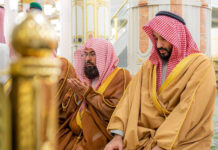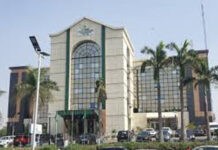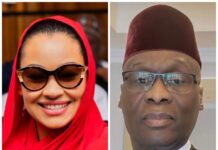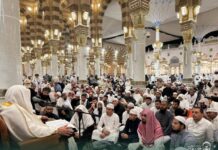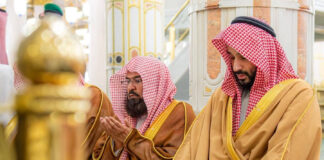Tracking down the Chairman and CEO, National Hajj Commission of Nigeria, NAHCON, Alhaji Zikrullah Kunle Hassan, for an interview was more herculean than digging the Chinese tunnel. A very busy man, thinking and managing hajj services all through the year. Even on Sundays, he had copious functions to attend. After several call-offs, but with the never-stop-trying attitude, I had to be at an event where he was being expected an hour ahead of him to ask him a few questions, yet it failed. This interview was conducted in his car while riding with him to another event on a breezy and cool Sunday.
He addressed a number of issues concerning the conduct of 2023 Hajj as well as the preparations and expectations of 2024 Hajj exercise. He revealed issues surrounding the disappointment faced by some Licensed Tour Operators during airlifting, spoke about new tent arrangements in Mina, Hajj Savings Scheme, HSS, Hajj as a challenge, and many more issues. Enjoy the full interview.
What are the feats and challenges at all stages of the 2023 Hajj exercise?
Hajj itself is challenging because it is a process where millions of people are gathered at the same time in a specific place, whether in Mina, Arafat, or Muzdalifah. The fact that you are processing the activities of a multitude of people at the same time is a challenge. The fact that we have capacity issues with some of our airlines is also a challenge. Of course, last year, the Sudan crisis that led to the shutting down of the airspace by the Sudanese authorities was also a challenge. The insufficient space in Muna was also a challenge. All in all, we have reason to be grateful to Allah that we planned to do Hajj, and it was done. We went with thousands of people, did hajj, and returned. We are indeed grateful to Allah. In at least ten years of history, the last hajj was the first time that we went with 95,000. In the last two hajjs, Nigerian pilgrims were about 60,000. The fact that we were able to go with that multitude and airlift everybody to Saudi Arabia and went to Mina and Arafat, and we returned home, for us, we say, Alhamdullilah.
What are you doing about the shortage of tents and the agitations by the state pilgrim boards for the control of the kitchen for their pilgrims, especially at Madinah and Muna?
In response to the shortage of tents in Mina, Saudi Arabia made a decision this year, which certainly would help to ameliorate this kind of challenge in the future.

One, as against the previous arrangement that visas are processed two days before your journey, the new arrangement now is that visa processing will be stopped for at least 50 days before Arafat. What this means is that at least 50 days before Hajj, they would have known the number of people coming from all countries. Secondly, they have also made it a rule that once you are done with your preparation, you can come to choose which area you want at the holy site. These had never happened before. We have always been in a particular place, where people have argued it is not the best place to be because it is too close to Muzdalifah instead of close to Muna. Now, they have given us the opportunity to choose where we want to be with the number of visas already processed once we are able to finish our preparations.
As regards the issue of feeding, it is not just the states that are agitating; it is also the agitation of the National Hajj Commission. Our argument still remains that there is no way the best cook in Saudi Arabia will be able to cook Nigerian food. We have said that repeatedly to the Saudi Arabian authorities. Only recently, the Vice President, Senator Kashim Shettima, GCON, also reiterated this fact that feeding our pilgrims should be done by our people. It is not just the agitation of the state; we are all saying it together. This is a place where people will be there for four to five days, and there are no legitimate markets to find alternatives. That is why the best alternative to the existing arrangement is to let our people do it. We have also made representations on behalf of all the pilgrims; we wrote to the authorities in Saudi Arabia, and we have requested a refund on behalf of the pilgrims. Usually, it takes time before you get a response in a matter like this, but we are hopeful we will get a positive response soonest. How adequate, we don’t know, but we are pursuing it relentlessly.
How have the state pilgrim boards helped in ensuring smooth hajj operation and curbing some of the challenges recorded in the last hajj, such as health challenges, pregnancies, etc.?
As you are aware, these are infractions. Particularly where pilgrims delivered babies and cases of miscarriages, these are infractions, and they are unacceptable. At the appropriate time, we will ensure that the states concerned are disciplined. It is part of our collective position that pregnant pilgrims are not allowed to go on hajj. In the Hajj Commission, our staff are made to go through screening, and some of the few who are found to be pregnant are excluded from the trip against their wishes. We should live by example, and that is why we were very disturbed when we heard the stories of miscarriage and giving birth in the Kingdom. Other than that, I will say the leadership of the states and NAHCON had been together because most of the decisions were taken together. So, to all intents and purposes, they have been part and parcel of the plan, the design, and the action of Hajj 2023. We know that sometimes there could be a little difference, but all in all, we have been cooperating to ensure that Hajj is done in the right way so that the pilgrims can have value for their money.

Recently, you announced N4.5 million as a deposit for 2024 Hajj. Even under this economic downturn, with the instability of the exchange rate, how can you ensure that Hajj fare does not go beyound the reach of prospective pilgrims?
We must understand that 97 percent of the cost of hajj is determined in foreign currency.
What are the main components of Hajj? First, the air tickets, which is about one-third of the cost of Hajj; the accommodation in Makkah and Madinah; the tents in Mina, Arafat, and Muzdalifah; the transportation all over the country; the feeding; then the service charge by the Saudi Company. All are determined by the exchange rate. The Hajj 2023 was conducted at a foreign exchange rate of N456 to a dollar, but as we speak now, the dollar is N714 to a dollar. We are praying it doesn’t get higher. So, we used our estimation based on the existing foreign exchange rate against the usual amount Hajj will cost in dollars. We announced that figure because we also needed to put people on notice early enough so that they can prepare for it, for those whom Allah has called. We are also not saying that the foreign exchange will not come down; we will be happy if it does, because the fare will also come down. But as far as the current rate is concerned, that is the basis for our assumptions. To be honest with you, the final cost is not known yet. If the rate comes down, of course, it will be less than that N4.5 million.
Is the Hajj Savings Scheme still in its nascent stage? If so, what is responsible? Are the states not giving the necessary support to realize the envisioned goals and benefits of the scheme?
The Hajj Savings Scheme is a novelty in Nigeria. And usually, when things are new, you need years for them to germinate. But at least, I can tell you that the Hajj Savings Scheme in the last few years that we started has been able to turn over in excess of N20 billion, and an excess of N600 million in profit has also been made. This modest scheme is a far cry from where we used to be three years ago. The states may not be doing much now, like I said, because it is novel, but I am sure that in the very near future, they will, because both the states and NAHCON have agreed that this is what we need to do. This is one reason why countries like Indonesia and Malaysia seem to be at the forefront in terms of Hajj management. Because the purpose of the scheme is not just financial, it allows Hajj to be planned for the future. In doing that, you will be able to make savings and investments together. On the part of the managers, you can determine those who will be going at a particular time or in the future and procure their services even in the future. You can buy the services of Hajj in the next three years at the wholesale price, which will also lessen the cost of Hajj. To answer your question more poignantly, the states so far have been trying, but they need to do more. I know that in the near future, there will be more result-oriented cooperation between the National Hajj Commission and the states.

There were allegations of internal sabotage in the commission; what is your take on this?
I will like to believe that my staff are human beings until the contrary is proven. They can make mistakes. But I will tell you that NAHCON staff are dedicated people, privileged to serve Muslim pilgrims.
I asked the question because Kaduna Pilgrimage Agency complained recently at the heat of airlifting that pilgrims registered under the HSS were not given slots, which accounted for their delay during the operations.
That had been resolved. I can confirm to you that there is no sabotage. I also think the Kaduna pilgrims board has done very well in their activities this year, and I know they will do more next hajj.
Why are the tour operators always have issues? Last year, it was the IBAN account not funded, this year, it was airline not capable. Some of them have said it was the Commission that gave them the airline. Why are they having such issues?
Well, on the contrary, in a letter written to the National Hajj Commission by the Tour Operators, signed by their leadership, it was all commendation. Commendation for being part of solutions to their challenges rather than the other way around. When you hear noises like that, it is usually from people who are not registered. There are so many people who call themselves Tour Operators, but they are not known to us. Sometimes, they make the loudest noise because they put one or two things together and call themselves Tour Operators; because they are known in the mosques and in their neighborhood, people assume they are registered.
READ ALSO: Hajj ’24: The New Dimensions
Besides, I think this year will be different. We must commend President Bola Ahmed Tinubu, GCFR, for the Dubai initiative. Not only will it impact Nigerians positively, but the Pilgrims will also benefit from it. This is because if Emirates and Etihad Airlines were to be flying, the chances are high that the tour operators would not even consider using chattered aircraft. Because the combination of using these two airlines, if they are on the ground, would take care of what the tour operators wanted. The tour operators were very clear; they said, “Look, the scheduled flights in Nigeria cannot take all their pilgrims; they need chartered aircraft.” And we secured Arik Airlines and Value Jets, and we asked them to discuss amongst themselves and come up with their decision. And in their wisdom, they chose Arik Air. Well, a number of things happened later, but the most important thing for us is that we succeeded in carrying all their pilgrims to the holy land. We hope that in the subsequent hajj, the tour operators will seriously collaborate with scheduled airlines so that they don’t have to take a chattered aircraft for their business. Remember that their pilgrims have only a little time to spend in the Kingdom of Saudi Arabia; it may be two weeks, and such arrangements are better with scheduled airlines.

Yes, it was IBAN last year; it was airlifting this year. The honest truth is that Hajj is about challenges. What any responsible manager should do is ensure that those challenges are well managed at any time they occur. Life itself is a challenge. Anyone who expects that life will go on without challenge is expecting a life of boredom. That doesn’t happen. Real life is about challenges, and that is just part of life. We just pray that whenever the challenge comes, we are able to tackle it effortlessly and appeal to all those who are concerned.
READ ALSO: Hajj 2024 N4.5m deposit: NAHCON urges intending pilgrims to pay now
What would you like to do differently this next hajj?
We are just at the beginning stage; in the next few days, I will be able to give more information about the 2024 hajj because we will be meeting with the Saudi Ministry of Hajj. The meeting is meant to take a look at the 2023 Hajj and have an elaborate discussion on the 2024 operations. But we have held a meeting with the states, and there, it was agreed on the initial deposit of N4.5 million. It was based on our review and our projection for 2024. The Commission has asked them to raise awareness in their different states.
Your advice for Muslims, especially those who have to struggle to pay this huge amount
Since creation, Muslims have been striving to go to hajj. It is their desire to see the House of Allah once in their lifetime. I am sure Allah will always give bounties to the Muslims who desire to go to Hajj. My first hajj was in 1987, and it was N7,000. We thought it was the highest cost Hajj will ever had in our generation. It later rose to N700,000. Those who desire to go but do not have such money could still go with the Hajj Savings Scheme. That was why the scheme was established. You can continue to save and plan Hajj for six to seven years and later go. But beyond that, he who desires to go should pray to Allah to increase his wealth and use part of it for Hajj. I am sure Allah will do so. A Muslim never loses hope; the Prophet said, “He is not one of us, he who loses hope.” We will continue to be hopeful. Once you are invited by Allah, He will provide how you will get there. I know the strategy being put in place by Mr. President is the best for us. It may be difficult now, but in the long run, all of us will have cause to praise Mr. President for his economic wizardry.
With this your busy schedules all through the week, how do you relax?
I relax when I am with my family and friends. That is my own way of relaxing.
We have a duty and responsibility to serve Allah, and we will do our best until He says we have had enough. After all, Allah says in the Holy Quran that you should worship Him until you are no more. Hajj management is part of worshiping Allah.

